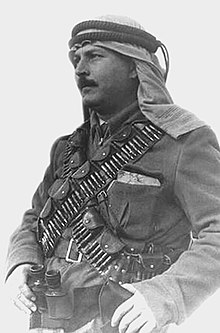Al-HUSSEINI, ABDUL QADER (1907-1948)
Born in Jerusalem on 8 April 1907; son of Musa Kathem (Pasha) Al-Husseini; raised in Jerusalem; educated at Ar-Rashidiyyeh School, then at the Bishop Gobat School (known as Zion’s School), and the Rawdat Al-Ma’aref School, graduating in 1927; participated in national demonstrations from the age of 13; enrolled at the AUB but was dismissed after a year for his political activities; founder (1930) and leader of the Al-Jihad Al-Muqaddas (Holy War) organization, with its main headquarters in Birzeit; moved to Cairo and joined the Faculty of Sciences, Chemistry Dept., at the AUC, from where he graduated with a BA in 1932; expressed his growing criticism of British-American policies in the region at his graduation ceremony and was subsequently deported from Egypt to Palestine in July 1932; became a member of the Palestinian Arab Party and served as its Secretary; expressed his ideas in his capacity as editor-in-chief of the party’s paper Al-Liwa’ and other newspapers, incl. Al-Jami’a Al-Islamiyya; organized the Congress of Educated Muslims in the early 1930s to fight discrimination against Palestinian Arabs in government services; with the aim of depoliticizing him, the British Mandate authorities appointed him as an officer in the Mandate Land Dept., where he managed to establish contacts and secret resistance cells with Palestinian villagers; resigned from the post in 1936; became leader of the Palestinian resistance during the Great Revolt of 1936-39; as the guerilla commander for the Jerusalem district led an attack on Beit Surik on 6 May 1936 and organized resistance from the mountains around the city; held secret meetings to organize Al-Jihad Al-Muqaddas and became its Commander-in-Chief; was responsible for attacks on British officials and the assassination of a police chief in Jerusalem who had treated Arabs in a humiliating manner; was wounded by British forces at the Beni Na’im battle (near Hebron) in 1936 and transferred to Damascus for treatment; then stayed for six months in Germany; returned to Jerusalem via Damascus in autumn 1937, taking Ein Kerem as the center of operations; was again wounded in 1939 and moved this time to Iraq, where he worked as a mathematics teacher at the Military College, Al-Rashid military base, in Baghdad; supported the Al-Kilani revolts and participated in the fight between the British and Iraqi armies in 1941; moved to Turkey through Iraq; but was soon arrested and detained for his political activities; his detention order was replaced by a 20-month exile to Zakho in northern Iraq; his wife, Wajiha, was also taken to Court and put under house arrest for 20 months in Baghdad; was released in 1943 following the interference of King Abdul Aziz Al-Sa’ud and left Iraq to Saudi Arabia; then moved to Egypt on 1 Jan. 1946; demanded ammunition from the Arab League to counter the ongoing Israeli military attacks on Palestinians, but his request was rejected; returned secretly to Jerusalem after the partition plan in 1947, became commander of the volunteer guerrilla force of Al-Jihad Al-Muqaddas (Holy War Army), and began organizing the resistance; was killed in a counter attack at Qastel, west of Jerusalem, on 8 April 1948; the next day he was buried at Al-Aqsa Mosque graveyard; father of Musa, Ghazi, and Faisal Al-Husseini.

ولد في القدس عام 1907؛ والده موسى كاظم باشا الحسيني؛ ترعرع ونشأ في القدس؛ تلقى تعليمه في مدرسة الرشيدية في القدس، ثم في مدرسة صهيون، ومدرسة روضة المعارف وتخرج عام 1927 ؛ شارك في المظاهرات الوطنية وهو ما يزال في ريعان شبابه؛ التحق بالجامعة الأمريكية في بيروت ولكنه فصل بعد سنه بسبب نشاطاته السياسية؛ انتقل إلى القاهرة والتحق بكلية العلوم، دائرة الكيمياء في الجامعة الأمريكية في القاهرة، حيث تخرج وحصل على شهادة البكالوريوس عام 1932؛ عبّر عن نقده المتنامي للسياسات البريطانية - الأمريكية في المنطقة في حفل التخرج وبالتالي تم ترحيله من القاهرة إلى فلسطين في شهر تموز/ يوليو عام 1932؛ أصبح عضواً في الحزب العربي الفلسطيني الذي ترأسه جمال الحسيني وشغل منصب سكرتير الحزب؛ عبّر عن أفكاره بصفته رئيس تحرير صحيفة الحزب اللواء وصحف أخرى، بما فيها الجمعية الإسلامية؛ نظم مؤتمر المسلمين المثقفين في أوائل الثلاثينات لمحاربة التمييز ضد العرب الفلسطينيين في الخدمات الحكومية؛ وبهدف عدم تسييسه، قامت سلطات الانتداب البريطاني بتعيينه كموظف في دائرة أراضي الانتداب حيت تمكن من إقامة اتصالات وخلايا المقاومة السرية مع القرى الفلسطينية؛ استقال من منصبه عام 1936 أصبح قائداً للمقاومة الفلسطينية خلال الثورة الكبرى 1936 - 1939؛ وكقائد لمنطقة القدس، قاد هجوماً على قوات الهاغاناة في بيت سوريك في السادس من أيار عام 1936 ونظم المقاومة من الجبال حول المدينة؛ عقد اجتماعات سرية لتنظيم الجهاد المقدس وأصبح القائد الأعلى للقوات المسلحة لمنظمة الجهاد المقدس عام 1936؛ أصابته القوات البريطانية بجروح في معركة بني نعيم بالقرب من الخليل عام 1936 وتم نقله إلى دمشق لتلقى العلاج الطبي؛ ثم بقي في ألمانيا لمدة ستة أشهر؛ عاد إلى القدس عبر دمشق في خريف عام 1937 حيث أخذ منطقة عين كارم في القدس كمركز للعمليات؛ أصيب بجروح مرة أخرى عام 1939 وانتقل هذه المرة إلى العراق حيث عمل كمدرس رياضيات في الكلية العسكرية، قاعدة الرشيد العسكرية، في بغداد؛ دعم ثورة رشيد عالي الكيلاني وشارك في القتال بين الجيوش البريطانية والعراقية عام 1941 انتقل إلى تركيا عبر العراق؛ ولكن سرعان ما اعتقل وسجن؛ تم استبدال أمر اعتقاله بعشرين شهر في المنفى في زاكو، شمال العراق؛ تم أيضاً أخذ زوجته، وجيهة، إلى المحكمة ووضعت تحت الإقامة الجبرية لمدة عشرين شهراً في بغداد؛ تم الإفراج عنه عام 1943 بعد تدخل الملك عبد العزيز آل سعود وترك العراق متوجهاً إلى المملكة العربية السعودية؛ ثم انتقل إلى القاهرة في الأول من كانون الثاني/ يناير 1946؛ طلب ذخيرة حربية من جامعة الدول العربية لمواجهة الهجمات العسكرية الإسرائيلية المستمرة ضد الفلسطينيين؛ عاد سراً إلى القدس بعد قرار تقسيم فلسطين عام 1947، وأصبح قائد قوة المقاومة المتطوعة للجهاد المقدس، وبدأ بتنظيم المقاومة؛ قتل في مواجهة مع قوات الهاغاناة في معركة القسطل، غرب القدس، في الثامن من نيسان/ إبريل 1948؛ دفن في اليوم التالي في مقبرة المسجد الأقصى؛ وترك وراءه أولاده الثلاث غازي وفيصل وموسى.
